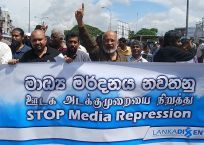Ilankai Tamil Sangam30th Year on the Web Association of Tamils of Sri Lanka in the USA |
||||
 Home Home Archives Archives |
Human Rights Abuses in Sri Lanka Flourish under Veil of Secrecyby Amnesty International, May 2, 2008
Ensuring respect for human rights around the world very often relies on impartial and rigorous media coverage – without exposure and public scrutiny abuses can flourish under a veil of secrecy and denial.
This need is particularly strong in Sri Lanka, where fatalities on all sides are believed to be very high with large numbers of civilians caught in the crossfire. All parties to the conflict are responsible for grave violations of human rights and breaches of international humanitarian law. The International Committee of the Red Cross (ICRC) has expressed concern that "since the start of the year civilian casualties had gone up as the number of indiscriminate attacks had grown in the north, east and south of the country." Despite the gravity of the human cost of war, Sri Lanka is a conflict where journalists face unjustified restrictions on reporting and there are very few established facts. In fact, both sides consistently contradict each other. The conflict in Sri Lanka is between government forces, the Liberation Tigers of Tamil Eelam (LTTE) and armed Tamil groups alleged to be aligned with the government. Sri Lanka, as Amnesty International reported in its February report Silencing Dissent, is a country where media coverage of war has effectively been silenced – through threats, restrictions and violence. The conflict in the north and east of Sri Lanka has continued to escalate since the ending of the ceasefire agreement on 16 January 2008. The withdrawal of the Sri Lankan Monitoring Mission responsible for monitoring the implementation of the 2002 ceasefire agreement means that there is a vacuum of independent reporting of human rights violations. This makes it more urgent that journalists are allowed to report without undue restrictions and document human rights abuses on the ground. Yet journalists are often barred from conflict areas. The LTTE does not allow independent reporting in the areas under its control, while the government masks the cost of the war. According to the Free Media Movement, a Colombo-based media watchdog, Government of Sri Lanka officials have barred photographers in the past week from entering hospitals in Colombo where Sri Lanka Army (SLA) soldiers injured in battle in late April are being treated. According to the International Federation of Journalists, 25 journalists from the minority Tamil community had fled the Jaffna peninsula where government forces are battling Tamil Tiger rebels. It is two years since support staff Suresh Kumar and Rajiv Kumar were gunned down at the Jaffna-based Uthayan newspaper office on 2 May 2006. The newspaper has come under severe attack because of its alleged Tamil nationalist stance. Seven media workers have been killed in Jaffna since the beginning of May 2006, four of these working with Uthayan. Gunmen on motorcycles attacked the office and killed the two workers in the absence of the journalists the gunmen were apparently looking for. The killers still walk free. "Publishing our daily newspaper in Jaffna is an increasingly Herculean and dangerous task with armed gunmen who continuously threaten our work and our lives," said the editor of Uthayan. To date, the organisation is unaware of any investigation that has led to the arrest and prosecution of those believed responsible for the killing of journalists and other media workers. In another incident, journalist Jayaprakash Sittampalam Tissainayagam was arrested on 7 March and has been held in the Terrorist Investigation Division Detention centre in Colombo since. The authorities have claimed that he is held on suspicion of involvement with the LTTE, although he has not been charged with any offence. Amnesty International has said that his detention is arbitrary. He is at risk of going blind if he does not receive specialist treatment for a serious eye condition. In all, at least 10 media workers have been unlawfully killed in Sri Lanka since the beginning of 2006. Others have been arbitrarily detained, tortured and allegedly disappeared while in the custody of security forces. For Press Freedom Day 2008, Amnesty International has urged the Sri Lankan government to protect media workers and their rights to life, liberty and security of person, in compliance with Sri Lanka’s obligations under international law. The organization has also called on the government to respect media workers and publicly announce that killings, threats, or other attacks will not be tolerated and to investigate all cases of attacks, disappearances and killings of media workers promptly, independently, impartially and effectively, irrespective of the identity of perpetrators or victims. The organisation is also calling on the LTTE to issue instructions to all its members to cease all killings, threats or other attacks on media workers. All parties to the conflict must stop targeting journalists. ENDS// |
|||
|
||||
